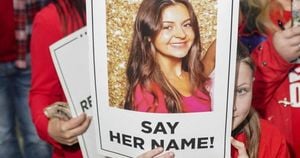Blame it on the final hours leading up to the state Assembly by-elections, but the political atmosphere in Uttar Pradesh feels charged with controversy. The Samajwadi Party (SP) has stirred the pot by claiming the police were removing Muslim women's burqas for identity checks at polling booths. This has raised serious concerns among voters, prompting the SP's Uttar Pradesh chief Shyam Lal Pal to write to the Election Commission (EC) urging them to intervene.
The upcoming by-elections on November 20 are expected to be highly publicized, especially since they follow the contentious Lok Sabha elections earlier this year. The stakes are high, with nine key constituencies, including Kundarki, Meerapur, Ghaziabad, and others, slated to vote next week. With the backdrop of minority voters feeling increasingly uneasy, the SP's letter emphasizes the need for sensitivity during the polling process.
Pal's correspondence outlined alarming incidents from the previous elections where police, allegedly under the guise of verifying voter identification, forced Muslim women voters to remove their burqas. He contended this not only intimidated voters but also led to many women leaving the polling stations without casting their votes. According to him, the actions taken by police during the elections created fear, discouraging participation and potentially impacting voter turnout.
"Many SP supporters, especially Muslim women, left polling stations without voting due to the discomfort and intimidation they faced," Pal stated. He argued this abuse of power by the police is unacceptable, asserting no police official has the right to check the voter IDs of burqa-clad women.
But how did the other political parties react to this? The Bharatiya Janata Party (BJP) has accused the SP of trying to communalize and polarize the electorate along religious lines. BJP spokesperson Mukhtar Abbas Naqvi criticized the SP's move, labeling it as yet another example of fake secularism aimed at sowing division among communities. He claimed, "This is what you will hear when fake voters and pseudo-secular voices will be exposed."
Tensions escalated with Rashtriya Janata Dal (RJD) expressing their unease about the entire situation, pushing to place responsibility on Prime Minister Narendra Modi to address this growing concern. RJD MP Manoj Jha commented, "It is sad to see such differentiation taking place. The Prime Minister must treat everyone equally, irrespective of their religious beliefs."
Questions have arisen over the responsibility of polling officers versus police personnel. The SP's letter to the EC included explicit requests to direct law enforcement and polling officials not to engage in practices deemed abusive toward voters, particularly women. Polling officers, according to the letter, are the only ones authorized to check voter IDs, not the police.
This concern isn't new—it resonates within the broader conversation on how minority communities are sometimes treated during elections. Many voters are unsure of their voting rights, particularly with allegations floating around of booth-level officers failing to adequately inform voters of their polling locations. The Congress party has rallied behind the SP, with Congress MP Pramod Tiwari alleging the authorities' conduct aimed at intimidating the minority community during this electoral process.
Despite these allegations, the BJP maintains its stance, asserting police possess legal authority to act as needed at polling stations and check identities when required, which contrasts starkly with the SP’s version of events.
The upcoming elections are shaping up to be pivotal for all parties involved, and how voter concerns are managed will play a significant role. The outcome could influence not only public perceptions of these political entities but may also redefine the narratives they create moving forward.
All of this leads to the crux of the matter: will the electoral process be safeguarded for everyone, or will certain voices—and their rights—be drowned out by political gamesmanship? With each side drawing its weapons, the polling booth of Uttar Pradesh stands at the battleground for voices far beyond its borders.



